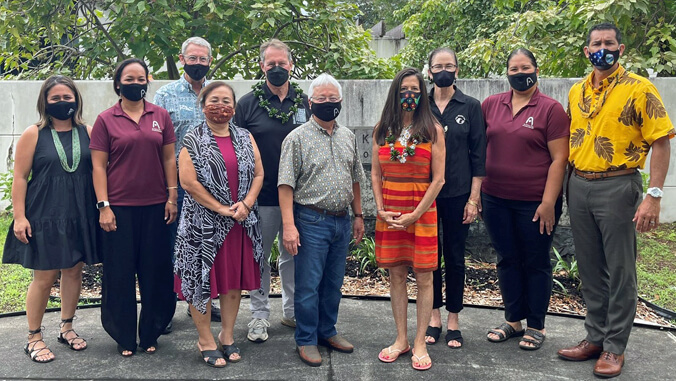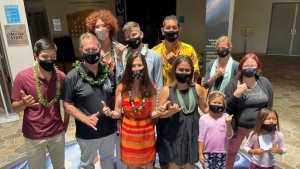
Members of the U.S. House of Representatives spent time at the University of Hawaiʻi at Hilo on August 13 to learn more about programs offered on-campus related to Indigenous culture and ʻōlelo Hawaiʻi (Hawaiian language) revitalization.
Hawaiʻi Congressman Kai Kahele, a UH Hilo alumnus, hosted Congressman Ed Case (Hawaiʻi) and Congresswoman Teresa Leger Fernández (New Mexico) on a visit to Hawaiʻi Island, which included a stop at the university.
Rep. Leger Fernández and Rep. Case are members of the House Subcommittee for Indigenous Peoples of the United States. The subcommittee is part of the House Committee on Natural Resources and oversees matters ranging from land management to social welfare and energy use.

The group toured Ka Haka ʻUla o Keʻelikōlani College of Hawaiian Language and ʻImiloa Astronomy Center at UH Hilo.
“The opportunity to have both of Hawaiʻi’s representatives and Rep. Leger Fernández meet with us at Ka Haka ʻUla was very encouraging relative to the distinctive mission of the college for Indigenous language revitalization, both here in Hawaiʻi and on a national level,” said Pila Wilson, professor of Hawaiian studies. “Representative Kahele has first-hand experience in having his children enrolled in our Hawaiian medium laboratory school and spoke to the strength of our program.”
Wilson explained that Case talked about his experience in following the college’s efforts throughout the past four decades and his positive impressions of the progress made. Leger Fernández was emotionally moved by the work of the college and expressed her strong support for Indigenous language survival and its connection to work with other language minorities throughout the nation.
“Having these three crucial congress people visit the college was a great honor and provided an opportunity to further connect to federal initiatives on behalf of Indigenous languages and the larger language-related movements for minority populations,” Wilson said.
For more go to UH Hilo Stories.
—By Susan Enright

